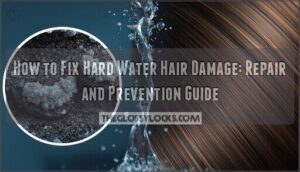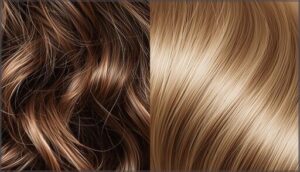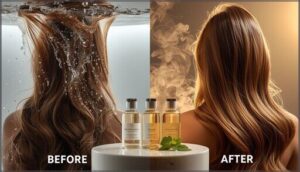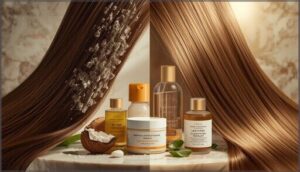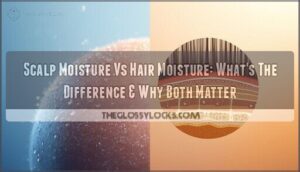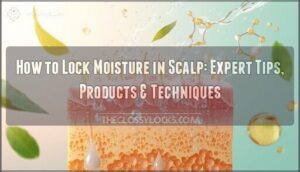This site is supported by our readers. We may earn a commission, at no cost to you, if you purchase through links.
Your hair shouldn’t feel like straw after every shower, yet millions of people watch their once-soft strands transform into rough, tangled messes thanks to calcium and magnesium minerals lurking in their tap water. These dissolved ions don’t just rinse away—they bond to your hair’s cuticle scales, building up layer after layer until your hair can barely absorb moisture or hold its color.
The frustration intensifies when traditional conditioners fail because they’re battling an invisible mineral coating that blocks every treatment you apply.
Understanding how mineral buildup damages hair structure gives you the power to reverse this process through targeted chelating treatments, strategic rinses, and preventive measures that stop hard water from hijacking your hair health.
Table Of Contents
Key Takeaways
- Hard water minerals—primarily calcium and magnesium—bond directly to your hair’s cuticle scales and disrupt the protective lipid layer, creating a progressive cycle of dryness, brittleness, and color fading that worsens with each wash.
- Chelating shampoos containing EDTA remove mineral deposits more effectively than clarifying formulas alone, while acidic rinses using diluted apple cider vinegar (pH 2-3) dissolve remaining buildup and restore cuticle integrity when applied weekly.
- Installing a whole-house water softener provides the most comprehensive long-term protection against recurring damage, with 78% of users reporting dramatically improved hair manageability despite the $1,500 average installation cost.
- Severe hard water damage can only be partially reversed through treatments—you’ll restore shine and softness, but compromised fiber strength remains until damaged sections are trimmed and replaced by new growth.
What Causes Hard Water Hair Damage?
Your hair isn’t imagining things—hard water really does wreak havoc on those strands. When mineral-laden water makes contact with your hair day after day, it creates a cascade of structural changes that leave you frustrated and reaching for more products.
Let’s break down exactly what’s happening beneath the surface and why your hair reacts the way it does.
Mineral Content in Hard Water
Hard water contains dissolved calcium and magnesium ions that create mineral buildup on your hair shaft. Water testing reveals hardness levels measured in milligrams per liter—anything above 120 mg/L qualifies as hard.
The mineral content in your water determines the severity of mineral deposits. Calcium impact and ion effects accumulate with every wash, transforming your hair from manageable to damaged through persistent water hardness exposure.
Understanding water hardness levels is vital to addressing hair damage caused by hard water.
How Minerals Affect Hair Structure
When calcium and magnesium settle onto your hair shaft, they don’t just sit there—they bond to the cuticle scales and disrupt your hair’s protective lipid layer. This mineral buildup increases hair porosity, allowing more ions to penetrate deeper.
When hard water minerals bond to your hair, they disrupt the protective lipid layer and increase porosity, allowing deeper ion penetration
The result? Cuticle damage weakens fiber strength, creating rough, brittle strands prone to breakage. Your scalp health suffers too, as deposits accumulate and interfere with moisture balance.
Restoring the hair’s natural hydrophobicity with hair fiber lipids can help mitigate this damage.
Common Signs of Hard Water Damage
Now that you understand how mineral deposits destabilize your cuticle, recognizing the warning signs becomes straightforward. Dryness causes persistent roughness—over 60% of hard-water users describe hair as extremely dry.
You’ll notice hair brittleness, increased breakage, and dull, coated strands that tangle easily. Color fading accelerates within weeks, and scalp irritation—flaking, tightness—signals ongoing mineral buildup disrupting your scalp’s barrier and contributing to hair loss over time.
How to Identify Hard Water Hair Damage
Your hair’s been shouting at you, but you mightn’t have realized it’s a hard water problem. The signs aren’t always obvious at first—mineral buildup disguises itself as bad hair days or product failures.
Let’s break down the specific visual cues and physical changes that point directly to hard water damage.
Visual and Textural Hair Changes
When mineral deposits coat your hair shaft, you’ll notice immediate changes—strands feel rougher to the touch and resist smooth styling. Hard water damage manifests as persistent frizzy hair, brittle hair that snaps easily, and dry hair lacking natural sheen.
Your usual texture change signals buildup: hair becomes coarse, unmanageable, and prone to tangling despite conditioning efforts.
Effects on Hair Color and Scalp
Color fading accelerates when calcium, magnesium, iron, and copper coat your hair shaft, blocking dye penetration and dulling your cuticle. You’ll notice brassy tones, unwanted green or orange hues, and lifeless color—especially if you’re chemically treated.
Meanwhile, mineral buildup strips your scalp’s natural oils, triggering irritation and dryness, and exacerbating conditions like dandruff or psoriasis through follicle-clogging deposits.
Immediate Steps to Repair Hard Water Hair
Once you’ve confirmed hard water is wreaking havoc on your hair, you’ll want to act quickly to reverse the mineral buildup and restore your hair’s integrity.
The good news is that several targeted treatments can chelate those stubborn deposits and replenish moisture from the inside out.
Here’s how to tackle the damage head-on with three proven repair strategies.
Using Clarifying and Chelating Shampoos
You’ll need two distinct formulas to combat hard water hair damage: clarifying shampoos lift surface buildup, while chelating shampoo targets deeper mineral deposits through chelating agents like EDTA.
For hair detox, use clarifying benefits weekly and mineral removal treatments bi-weekly. This shampoo frequency prevents over-stripping natural oils while ensuring effective hard water hair damage reversal and ongoing hair damage prevention through consistent application.
Apple Cider Vinegar and Citrus Rinses
You can shift the balance of power after clarifying shampoos by harnessing acidic rinse benefits. Apple cider vinegar at pH 2–3 and citrus juice dismantle mineral deposits that chelating shampoos leave behind, promoting hair cuticle repair through swift pH normalization.
Core Application Protocol:
- Dilution ratio: Mix 1–2 tablespoons vinegar in 8–10 ounces filtered water
- Contact time: Leave 1–5 minutes post-shampoo for mineral removal
- Frequency: Apply once weekly to prevent scalp irritation
- Temperature: Rinse with cool water to seal cuticles
- Alternatives: Substitute citrus hair masks using lemon juice diluted 1:8 for comparable hard water hair damage reversal
Deep Conditioning and Hair Masks
After you’ve cleared mineral residue, deep conditioning becomes your repair engine. Moisturizing products with shea butter or argan oil form a protective seal over damaged cuticles, while protein masks rebuild keratin bonds weakened by calcium overload. Apply your hair mask weekly on towel-dried strands for 5–10 minutes, rotating between moisture-focused and protein-rich hair treatments every 2–4 weeks to restore elasticity without stiffness.
Hair oil treatments using coconut oil before shampooing reduce water-induced stress, while chelating agents in some masks dissolve lingering deposits. This protocol tackles both moisture loss and structural damage, gradually improving softness and reducing breakage over several weeks.
| Treatment Type | Key Ingredients | Mask Frequency |
|---|---|---|
| Moisturizing | Shea butter, argan oil, glycerin | Weekly |
| Protein repair | Hydrolyzed keratin, silk amino acids | Every 1–4 weeks |
| Pre-treatment | Coconut oil, chelating agents (EDTA) | Before each wash or biweekly |
Long-Term Solutions for Preventing Damage
Once you’ve cleared the mineral buildup from your hair, the real work begins: keeping it from coming back. Long-term protection requires you to address the water itself and rethink how you care for your hair and scalp in a hard water environment.
Below are three proven strategies that give you control over the damage before it starts.
Installing Shower Filters or Water Softeners
If you’re done exploring quick fixes, it’s time to confront hard water at the source. A shower filter removes chlorine and heavy metals—usually under $100—but won’t eliminate calcium or magnesium that cause mineral buildup.
For true softening, you’ll need a whole-house water softener. Installation averages $1,500, plus ongoing salt replenishment every few weeks, yet research shows 78% of users report dramatically improved hair shine and manageability.
Adjusting Hair Care Routines for Hard Water
Once you’ve installed a shower filter or softener—or while you’re considering water softener benefits—you need to rework your entire hair care routine. Studies show repeated hard-water washes drop tensile strength by 30%, so these adjustments aren’t optional.
- Wash less often: Limit shampooing to 2–3 times weekly to reduce mineral exposure and cuticle disruption.
- Rotate chelating formulas: Use EDTA- or citric-acid-based shampoos every 1–4 weeks for mineral removal techniques.
- Add pH-balancing rinses: Diluted apple cider vinegar once weekly flattens cuticles and blocks future buildup.
Protective Styles and Scalp Care Techniques
Beyond cleaner water, your scalp needs active defense. Clinical trials show daily scalp massage over 24 weeks increases shaft thickness by 8%, enhancing hair health and circulation even when minerals persist.
Pair that with low manipulation—loose twists or buns that cut friction—and weekly hair oil therapy using tea tree or jojoba to soothe scalp irritation and reduce hair breakage from gentle combing and scalp exfoliation.
Best Products and Treatments for Hard Water Hair
Choosing the right products can make or break your progress in reversing hard water damage. You need formulations that actively remove mineral buildup while restoring moisture and structural integrity to compromised strands.
Here’s what actually works when hard water has taken its toll on your hair.
Recommended Shampoos and Conditioners
Selecting the right shampoo and conditioner starts with understanding your hair’s mineral burden and color treatment status. Your formula must do more than cleanse—it must actively reverse damage while protecting what’s left.
- Chelating shampoo with EDTA binds calcium, magnesium, iron, and zinc, lifting them from your hair shaft in one wash cycle
- Sulfate-free, color-safe formulas remove mineral buildup without stripping dye molecules or accelerating fade
- Clarifying shampoos for weekly maintenance dissolve sebum and styling residue between full chelating treatments
- Hydrating conditioners with argan or jojoba oil restore slip and flexibility to mineral-roughened cuticles
- Chelating shampoo bars with citric acid offer eco-conscious mineral removal for fine hair prone to flatness
Leave-in Treatments and Oils
After rinsing out your chelating conditioner, reach for leave-in treatments and oils that rebuild your hair’s moisture barrier.
Chelating agents in lightweight leave-in sprays bind minerals between washes, while occlusive barriers from coconut or argan oil seal cuticles and block moisture loss.
Choose formulas offering heat protection if you style with tools—your hard-water-damaged fibers need every defense against further structural breakdown.
Professional Salon Treatments for Repair
When home treatments plateau, professional chelating therapy removes up to 98% of cortex-level mineral deposits in one session. Pair that with bond repair systems that reconnect broken disulfide bridges—some reduce breakage by 56%.
Keratin smoothing coats roughened cuticles, while gloss treatments correct mineral-induced brassiness and restore reflectivity for 4–6 weeks.
These detox services set the stage for stronger hair care solutions and lasting hair health maintenance.
Frequently Asked Questions (FAQs)
Can hard water damage be reversed completely?
Hard water hair damage is only partially reversible. You can restore shine, softness, and manageability through chelating treatments, but weakened fiber strength remains until damaged lengths are trimmed and replaced by new growth.
How long does hard water hair repair take?
Your repair timeframe depends on damage severity, hair porosity, and treatment consistency. Mild cases respond within days to weeks, while severe hard water hair damage may need months of dedicated hair care solutions and water hardness mitigation.
Are certain hair types more vulnerable to damage?
Picture your hair shaft like a sponge—some absorb water instantly, others resist. High porosity, curly hair, fine strands, and chemically treated locks face heightened vulnerability to hard water’s mineral assault, demanding targeted scalp health protection strategies.
Will hard water affect hair extensions or wigs?
Yes, hard water accelerates extension mineral buildup and synthetic fiber damage on both wigs and hair extensions. You’ll notice faster discoloration risks and bond deterioration, but protective measures like filtered water washing can minimize hair damage.
Conclusion
Ironically, the water meant to cleanse your hair has been quietly destroying it all along. Now that you understand how to fix hard water hair damage through chelating treatments, acidic rinses, and filtration systems, you’ve reclaimed control from those microscopic mineral invaders.
Your cuticles can finally lie flat again, moisture can penetrate freely, and your strands can return to their natural softness. The solution was never better products—it was better water.
- https://www.healthline.com/health/hard-water-hair-damage-treatment
- https://www.pureshowers.co.uk/shower-filter-blog/what-hard-water-does-to-your-hair-science-explained
- https://hellohibar.com/blogs/news/effects-of-hard-water-on-hair
- https://www.frizzlife.com/blogs/guide/hard-water-hair-treatment-effective-solutions-for-hair-care
- https://bostingner.com/blogs/news/does-shower-filter-really-prevent-hair-loss

